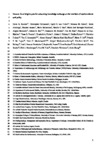Lessons from bright-spots for advancing knowledge exchange at the interface of marine science and policy
| dc.contributor.author | Karcher, DB | |
| dc.contributor.author | Cvitanovic, C | |
| dc.contributor.author | van Putten, IE | |
| dc.contributor.author | Colvin, RM | |
| dc.contributor.author | Armitage, D | |
| dc.contributor.author | Aswani, S | |
| dc.contributor.author | Ballesteros, M | |
| dc.contributor.author | Ban, NC | |
| dc.contributor.author | Barragán-Paladines, MJ | |
| dc.contributor.author | Bednarek, A | |
| dc.contributor.author | Bell, JD | |
| dc.contributor.author | Brooks, CM | |
| dc.contributor.author | Daw, TM | |
| dc.contributor.author | de la Cruz-Modino, R | |
| dc.contributor.author | Francis, TB | |
| dc.contributor.author | Fulton, EA | |
| dc.contributor.author | Hobday, AJ | |
| dc.contributor.author | Holcer, D | |
| dc.contributor.author | Hudson, C | |
| dc.contributor.author | Jennerjahn, TC | |
| dc.contributor.author | Kinney, A | |
| dc.contributor.author | Knol-Kauffman, M | |
| dc.contributor.author | Löf, MF | |
| dc.contributor.author | Lopes, PFM | |
| dc.contributor.author | Mackelworth, PC | |
| dc.contributor.author | McQuatters-Gollop, A | |
| dc.contributor.author | Muhl, E-K | |
| dc.contributor.author | Neihapi, P | |
| dc.contributor.author | Pascual-Fernández, JJ | |
| dc.contributor.author | Posner, SM | |
| dc.contributor.author | Runhaar, H | |
| dc.contributor.author | Sainsbury, K | |
| dc.contributor.author | Sander, G | |
| dc.contributor.author | Steenbergen, DJ | |
| dc.contributor.author | Tuda, PM | |
| dc.contributor.author | Whiteman, E | |
| dc.contributor.author | Zhang, J | |
| dc.date.accessioned | 2022-05-03T11:22:26Z | |
| dc.date.issued | 2022-07-15 | |
| dc.identifier.issn | 0301-4797 | |
| dc.identifier.issn | 1095-8630 | |
| dc.identifier.other | 114994 | |
| dc.identifier.uri | http://hdl.handle.net/10026.1/19143 | |
| dc.description.abstract |
Evidence-informed decision-making is in increasing demand given growing pressures on marine environments. A way to facilitate this is by knowledge exchange among marine scientists and decision-makers. While many barriers are reported in the literature, there are also examples whereby research has successfully informed marine decision-making (i.e., 'bright-spots'). Here, we identify and analyze 25 bright-spots from a wide range of marine fields, contexts, and locations to provide insights into how to improve knowledge exchange at the interface of marine science and policy. Through qualitative surveys we investigate what initiated the bright-spots, their goals, and approaches to knowledge exchange. We also seek to identify what outcomes/impacts have been achieved, the enablers of success, and what lessons can be learnt to guide future knowledge exchange efforts. Results show that a diversity of approaches were used for knowledge exchange, from consultative engagement to genuine knowledge co-production. We show that diverse successes at the interface of marine science and policy are achievable and include impacts on policy, people, and governance. Such successes were enabled by factors related to the actors, processes, support, context, and timing. For example, the importance of involving diverse actors and managing positive relationships is a key lesson for success. However, enabling routine success will require: 1) transforming the ways in which we train scientists to include a greater focus on interpersonal skills, 2) institutionalizing and supporting knowledge exchange activities in organizational agendas, 3) conceptualizing and implementing broader research impact metrics, and 4) transforming funding mechanisms to focus on need-based interventions, impact planning, and an acknowledgement of the required time and effort that underpin knowledge exchange activities. | |
| dc.format.extent | 114994-114994 | |
| dc.format.medium | Print-Electronic | |
| dc.language | en | |
| dc.language.iso | eng | |
| dc.publisher | Elsevier | |
| dc.subject | Research impact | |
| dc.subject | Marine environmental governance | |
| dc.subject | Science-policy interface | |
| dc.subject | Evidence-informed decision-making | |
| dc.subject | Transdisciplinary research | |
| dc.title | Lessons from bright-spots for advancing knowledge exchange at the interface of marine science and policy | |
| dc.type | journal-article | |
| dc.type | Journal Article | |
| plymouth.author-url | https://www.webofscience.com/api/gateway?GWVersion=2&SrcApp=PARTNER_APP&SrcAuth=LinksAMR&KeyUT=WOS:000878688900001&DestLinkType=FullRecord&DestApp=ALL_WOS&UsrCustomerID=11bb513d99f797142bcfeffcc58ea008 | |
| plymouth.volume | 314 | |
| plymouth.publication-status | Published | |
| plymouth.journal | Journal of Environmental Management | |
| dc.identifier.doi | 10.1016/j.jenvman.2022.114994 | |
| plymouth.organisational-group | /Plymouth | |
| plymouth.organisational-group | /Plymouth/Faculty of Science and Engineering | |
| plymouth.organisational-group | /Plymouth/Faculty of Science and Engineering/School of Biological and Marine Sciences | |
| plymouth.organisational-group | /Plymouth/REF 2021 Researchers by UoA | |
| plymouth.organisational-group | /Plymouth/REF 2021 Researchers by UoA/UoA07 Earth Systems and Environmental Sciences | |
| plymouth.organisational-group | /Plymouth/Users by role | |
| plymouth.organisational-group | /Plymouth/Users by role/Academics | |
| plymouth.organisational-group | /Plymouth/Users by role/Researchers in ResearchFish submission | |
| dc.publisher.place | England | |
| dcterms.dateAccepted | 2022-03-27 | |
| dc.rights.embargodate | 2023-4-19 | |
| dc.identifier.eissn | 1095-8630 | |
| dc.rights.embargoperiod | Not known | |
| rioxxterms.versionofrecord | 10.1016/j.jenvman.2022.114994 | |
| rioxxterms.licenseref.uri | http://www.rioxx.net/licenses/all-rights-reserved | |
| rioxxterms.licenseref.startdate | 2022-04-19 | |
| rioxxterms.type | Journal Article/Review | |
| plymouth.funder | Plankton science for supporting the implementation of marine ecosystem-based management and conservation::NERC |


